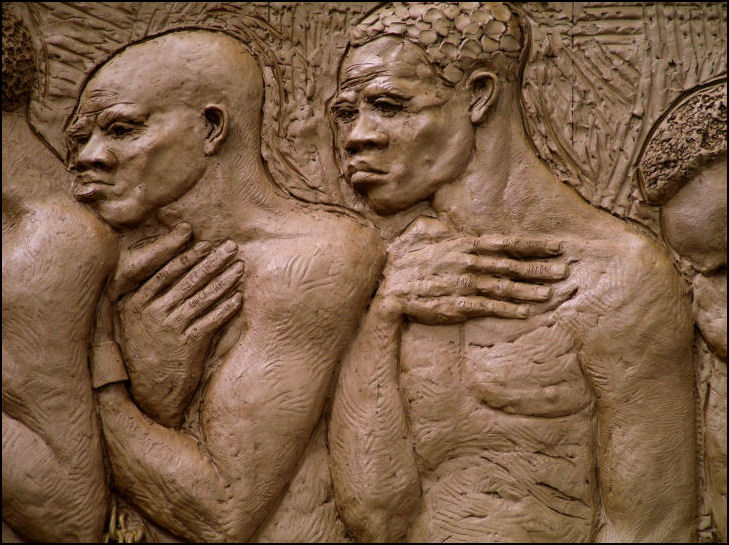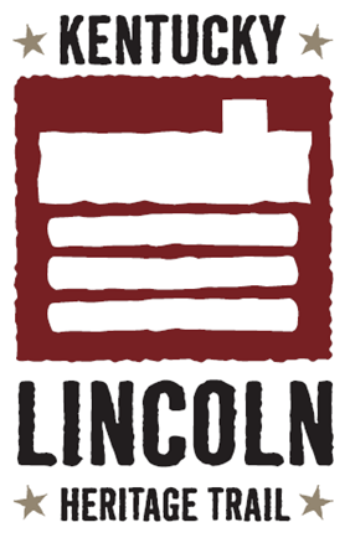Slavery, Emancipation, and Self-Liberation
Lincoln’s close ties to his native state brought him continually into contact with slavery, and his relationships with Kentuckians were pivotal to his evolving views on the institution. Lincoln’s boyhood experiences in Kentucky placed him firmly on the trajectory of opposing slavery, and Kentuckians such as Henry Clay did much to influence his beliefs and policies on “the peculiar institution.”
Lincoln’s boyhood was framed by his early exposure to the institution of slavery. It was at the Knob Creek farm that he saw slaves in chains for the first time as they were transported along the Louisville-Nashville Pike for sale farther South. His family’s membership in an anti-slavery Baptist congregation exposed him to the intense debate over slavery and an organized response to the moral and ethical quandaries related to human bondage. Abraham’s father, Thomas Lincoln, took his family out of Kentucky in 1816 and Lincoln later recalled that his father’s decision to leave for the free state of Indiana “was based partly on account of slavery.”
Lincoln’s in-laws, the Todds, were slave owners, and while visiting Lexington in 1847 and 1848, he learned firsthand about the institution. Because of these visits to Kentucky, his ideas that slavery should not be permitted to spread were strengthened. Lincoln’s distaste of slavery was also bolstered during his trip to Farmington in 1841. In addition to his close observation of dozens of slaves at Farmington, Lincoln saw a group of slaves forced onto a boat upon his departure. The memory of these slaves separated from their families remained embedded in his mind. Years later, Lincoln recalled the incident vividly, and stated in an 1855 letter to his friend Joshua Speed that the “sight was a continual torment to me … [having] the power of making me miserable.”
Perhaps no other person influenced Lincoln’s political beliefs more than Henry Clay, and this is especially true regarding slavery. As Lincoln stated in his eulogy of Clay in 1854, Clay was “ever was on principle and in feeling, opposed to slavery” and “did not perceive, that on a question of human right, the negroes were to be excepted from the human race.” Lincoln’s belief in gradual emancipation, which he carried until his presidency, further mirrored Clay’s position. Clay’s “very earliest, and one of the latest public efforts of his life,” Lincoln stated in his eulogy, “separated by a period of more than fifty years, were both made in favor of gradual emancipation of the slaves in Kentucky.” Lincoln was also influenced by the fiery Cassius Clay, whose anti-slavery views gained him national notoriety. Cassius Clay helped form the Republican Party and campaigned actively for Abraham Lincoln. He was later appointed minister to Russia.
As president, Lincoln initially hoped that Kentuckians would accept compensated emancipation, a process whereby they would be paid to free their slaves. Kentuckians rejected this offer. Lincoln, however, warned the state that unless they accepted compensated emancipation, it was likely that the Civil War would end slavery, leaving slaveholding Kentuckians to suffer vast economic losses. This proved prophetic.
As the war progressed and white Union military enlistment slowed, Federal authorities turned to another available source of manpower—African Americans. Recruitment in Kentucky began in earnest in February 1864 at Camp Nelson and Louisville. Loyal slave owners were to receive $300 for each slave who volunteered to the army, and fugitive slaves were pressed into the service. Eventually, more than 23,700 African-American Kentuckians joined the Union army, second only to Louisiana in numbers.
* Interpretive research provided by the Kentucky Historical Society and the National Park Service. All rights reserved.

Bas Relief of Slaves Being Sold South- Lincoln Memorial at Waterfront Park in Louisville
